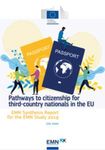Supporting Integration: Access to Citizenship in Ireland and the EU - EMN Ireland
←
→
Page content transcription
If your browser does not render page correctly, please read the page content below
EMN IRELAND/
ESRI ONLINE
CONFERENCE
Supporting Integration:
Access to Citizenship in
Ireland and the EU
8 December 2020 | Online
Photo credit: pxfuel
EMN Ireland is funded by
the European Union's
Asylum, Migration and
Integration Fund and co-
funded by the Department
of JusticeAbstract
This online conference, hosted by EMN Ireland, within the Economic
and Social Research Institute (ESRI), provides an opportunity to review a
decade of significant change to citizenship in Ireland, and to reflect on
international experience which may help to inform future policy direction.
Citizenship may be viewed as the highest level of ‘membership’ available to
migrants in their host country. Acquisition of citizenship can be both a result
of integration and can further improve social, economic and political
integration.
At this conference Prof. Maarten Vink, European University Institute and
Co-Director of the Global Citizenship Observatory (GLOBALCIT), will
provide a keynote talk presenting international research on the impact of
host-country citizenship on labour-market outcomes of migrants. Citizenship
is usually attained by migrants through the naturalisation “pathway” and this
conference will look first at the process of applying for naturalisation. Róisín
Dunbar (Irish Centre for Human Rights, NUI Galway, formerly EMN Ireland), will
present the findings of a new ESRI/EMN Ireland study, tracing recent
developments, while placing Ireland in an EU context. An NGO perspective on
the process in Ireland will be provided by Catherine Cosgrave (Immigrant
Council of Ireland) and the naturalisation process in Finland will be discussed
by Tuukka Lampi (EMN Finland). The second session will bring together
speakers to discuss the meaning of citizenship for migrants and what
constitutes “legitimate” requirements for naturalisation. Iseult Honohan
(University College Dublin) will discuss conceptions of citizenship and criteria
for naturalisation, the findings of a recent ESRI study on international practices
on civics and language requirements linked to naturalisation will be
presented by Michał Polakowski (EMN Ireland/Economic and Social Research
Institute) and Ricky van Oers (Radboud University, Netherlands) will consider
the impact of integration requirements on integration in Germany and the
Netherlands.
Recent ESRI & EMN Publications on Citizenship
Supporting Integration? Pathways to citizenship
International practices through naturalisation in
on civics and language Ireland
requirements linked to
naturalisation: Ireland
and the EU
Pathways to citizenship Pathways to citizenship
for third-country for third-country nationals
nationals in the EU: EMN in the EU: EU Synthesis
Inform Report
All EMN publications can be downloaded at www.emn.ie/emn-publicationsConference Agenda
Arrival
09:30 Welcome: Frances McGinnity, Associate Research Professor, Economic and Social
Research Institute
09:35 Keynote: Citizenship acquisition and labour market outcomes of migrants
Maarten Vink, European University Institute and Co-Director of the Global Citizenship
Observatory (GLOBALCIT)
10:05 Questions and Answers
Session 1: Pathways to Citizenship
Chair: Frances McGinnity, Associate Research Professor, Economic and Social Research
Institute
10:10 EMN Ireland study on Pathways to citizenship through naturalisation in Ireland
Róisín Dunbar, Irish Centre for Human Rights, NUI Galway (formerly EMN Ireland)
10:30 Irish citizenship: An overview of recent developments
Catherine Cosgrave, Immigrant Council of Ireland
10:50 Pathways to citizenship for third-country nationals in Finland
Tuukka Lampi, EMN Finland
11:10 Questions and Answers
11:25 Coffee break
Session 2: Citizenship, requirements and integration
Chair: Aonghus O'Connor, Principal Officer, Immigration Service Delivery, Department of
Justice
11:40 Conceptions of citizenship and criteria for naturalisation
Iseult Honohan, University College Dublin
12:00 International practices on civics and language requirements linked to naturalisation
Michał Polakowski, EMN Ireland/Economic and Social Research Institute
12:20 Deserving citizenship in Germany and the Netherlands: Citizenship tests in liberal
democracies
Ricky van Oers, Radboud University, Netherlands
12:40 Questions and Answers
13:00 CloseSpeaker and Chairs
Frances Frances McGinnity, Associate Research Professor, Economic and Social
McGinnity Research Institute (ESRI)
Frances McGinnity is an Associate Research Professor at the ESRI and Adjunct
Professor of Sociology at Trinity College Dublin. She is joint coordinator of the
research areas Social Inclusion & Equality and Migration, Integration &
Demography at the ESRI, and a Senior Research Advisor for the European
Migration Network (Ireland). She is co-coordinator of a research programme on
Human Rights and Equality, funded by the Irish Human Rights and Equality
Commission. Dr McGinnity is also coordinator of a research programme on
Integration and Equality for the Department of Children, Disability, Equality,
Integration and Youth. Recent research reports include the Monitoring Report
on Integration, which focuses on the economic, social and cultural integration of
migrants into Irish society; attitudes to minorities; migrant origin and integration
in Ireland. She led the first field experiment on discrimination in recruitment in
Ireland and collaborated with EU colleagues on a NORFACE project examining
early sociocultural integration patterns of migrants.
Maarten Vink Professor Maarten Vink, European University Institute and Co-Director of
the Global Citizenship Observatory (GLOBALCIT)
Maarten Vink is Chair in Citizenship Studies and Director of the Global
Citizenship research area within the Global Governance Programme at the
Robert Schuman Centre for Advanced Studies at the European University
Institute. He is also Co-Director of the Global Citizenship Observatory
(GLOBALCIT). Vink currently leads the research project “Migrant Life Course and
Legal Status Transition (MiLifeStatus)” funded by the European Research
Council.
Róisín Dunbar Róisín Dunbar, Irish Centre for Human Rights, NUI Galway
Róisín Dunbar was an intern with the Irish National Contact Point of the
European Migration Network for the summer of 2019, during which time she
worked on 'Pathways to Citizenship through Naturalisation in Ireland'. Róisín is a
BCL Law with Social Justice graduate of University College Dublin and has
recently graduated from NUI Galway with an LLM International
Migration and Refugee Law and Policy. Róisín is currently a researcher with UN
Special Rapporteur on trafficking in persons, especially women and
children, Professor Siobhán Mullally.
Catherine Catherine Cosgrave, Immigrant Council of Ireland
Cosgrave A specialised migration/human rights lawyer, Catherine is the author of several
leading publications relating to family and child migration, human trafficking
and citizenship. She is the Managing Solicitor at the Immigrant Council of Ireland
Independent Law Centre. In addition to legal practice, she has worked as a legal
trainer/consultant and lecturer at the University of Limerick and the Dublin
Institute of Technology. Catherine is the EUDO Ireland Country Expert on
Citizenship and sits on the Advisory Committee of the European Network on
Statelessness. Catherine is also the Fundamental Rights Agency Network
(Ireland) expert on migration.Speaker and Chairs
Tuukka Lampi Tuukka Lampi, European Migration Network, Finland
Tuukka Lampi is a senior specialist at the Finnish National Contact Point of
European Migration Network. Before joining the EMN Tukka worked at the
nationality unit of the Finnish Immigration Service as a senior advisor.
Previously Tukka also worked for the IOM as project assistant and the Finnish
Embassy in New Delhi as an immigration officer. Tuukka holds an MA in
English Philology from University of Helsinki and an MSc in Migration, Mobility and
Development from SOAS (School of Oriental and African Studies,
University of London).
Aonghus Aonghus O’Connor, Principal Officer, Immigration Service Delivery,
O'Connor Department of Justice
Aonghus O’ Connor is the Principal Officer within the Department of Justice with
line responsibility for service delivery for the following areas: Citizenship by
naturalisation, family reunification, Atypical working scheme, immigrant Investor
programme and Start-up Entrepreneurs programme. A qualified Accountant and
Chartered Banker, he holds MBSs in Change Management & Strategy and Banking,
with a passion for technology. He joined the Department of Justice from the
Central Bank of Ireland (CBI) some 24 months ago, having worked across the
banking industry for 15+ years. Over the past 24 months he has driven various
enhancements (including website redesign Irishimmigration.ie, e-payments, e-
forms, virtual assistance, restructuring the various units) leveraging technology to
enhance the customers’ experience.
Iseult Honohan Iseult Honohan, Associate Professor Emeritus in the School of Politics and
International Relations at University College Dublin
Iseult Honohan is an Associate Professor Emeritus in the School of Politics and
International Relations at University College Dublin, and a member of the
Royal Irish Academy. Her research interests lie especially in republican
political theory, both its foundations and its application to areas including
citizenship, immigration and diversity. Recent publications on citizenship
include 'Liberal and republican conceptions of citizenship' in The Oxford
Handbook of Citizenship (edited by A. Shachar, R Bauboeck, I. Bloemraad and
M.Vink) (2017) and ‘Just what’s wrong with losing citizenship? Withdrawal of
citizenship from a non-domination perspective’ Citizenship Studies (2020). She
contributes to applied research on citizenship acquisition with the Global
Citizenship Observatory (GLOBALCIT), and is currently working on extending its
citizenship acquisition indicators to include a historical series on global
birthright provisions.Speaker and Chairs
Michał Michał Polakowski, Policy Officer, EMN Ireland, Economic Social Research
Polakowski Institute
Michal Polakowski works within the Irish National Contact Point of the European
Migration Network (EMN), which is based in the ESRI. The overall objective of the
EMN is to improve the availability of, and access to, information concerning
migration and asylum at European and Member State level in order to support
policy and decision-making in the EU. Michał holds a PhD from Maastricht
University.
Ricky van Oers Ricky van Oers, Research Fellow, Radboud University
Ricky van Oers is a lawyer who defended her PhD research ‘Deserving Citizenship.
Citizenship Tests in Germany, the Netherlands and the UK’ (Brill, 2014) at Radboud
University in 2013.Besides her PhD research, Ricky has been involved in numerous
other international research projects, including the NATAC and EUCITAC-projects
which compared nationality legislation in EU Member States and the INTEC-
project, which aimed to provide an evaluation of changes in integration policy in
seven EU Member States by offering detailed and reliable information on the
content and the impact of compulsory elements in national integration policies.
She furthermore coordinated research projects into the implementation in the EU
Member States of the directives on family reunification and long-term resident
third-country nationals. Ricky van Oers studied law at Radboud University and the
Université Paris Descartes. She is currently a research fellow at the Centre for State
and Law of the Radboud University, and business developer for the University’s
Centre for Professional Legal Education.
Follow us
EMN Ireland
@EMNIreland Email emn.ireland@esri.ie
Tel +353 1 863 2000
european-migration-network-emn-ireland Web www.emn.ieYou can also read

























































